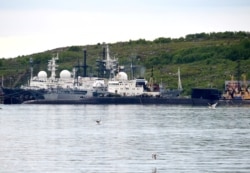The top U.S. commander in Europe is warning of daunting amounts of Chinese investment in European seaports and increases in Russian submarine activity outside of Europe.
U.S. Air Force Gen. Tod Wolters, commander of U.S. European Command and NATO’s Supreme Allied Commander Europe (SACEUR), testified at a Senate Armed Services Committee hearing Tuesday that “China has access to 10% of the shipping rights into and out of Europe.”
“It is very alarming,” Wolters said. “When you control the ability to take in and regulate resources, you have a large impact on what actually exists on the continent with respect to its ability to effectively generate peace and security.”
Wolters told lawmakers that China has invested an “economic majority” in seaports across Europe, including in NATO allies Belgium, Italy, France and Greece.
European allies have been surprised and concerned by the degree of equities China holds with respect to seaports, according to the general.
“In most cases … vigilance increases once we get past the education stage,” Wolters said.
Huawei/5G
The commander also echoed concerns about the Chinese company Huawei’s 5G wireless technology, which U.S. Secretary of Defense Mark Esper, U.S. Secretary of State Mike Pompeo and NATO Secretary-General Jens Stoltenberg discussed in Munich last week.
Esper warned Feb. 15 that China was seeking advantage over the U.S. and its allies in Europe, “by any means and at any cost.”
“Huawei and 5G are today’s poster child for this nefarious strategy,” Esper said, while Pompeo called Huawei a “Trojan horse.”
Stoltenberg also warned that Western allies shouldn’t risk security for short-term economic advantages with China to prevent both dividing European allies and dividing Europe from America.
Wolters affirmed the use of Huawei’s 5G technology is an intelligence threat to U.S. soldiers in Europe.
“Without the appropriate network protection, there is a potential compromise of technical data and personal data,” Wolters said.
Despite a decision by Britain last month not to ban Huawei equipment in its new 5G network, Wolters said he was encouraged by several other nations’ unwillingness to accept Huawei’s 5G technology.
He warned there must first be “a common understanding at the political level at NATO” that Chinese economic aggression in Europe is indeed a threat for U.S. and NATO counter efforts to take root.
Russia under sea threat
In addition to concerns about China, Wolters also sounded the alarm over Russian submarine activity, a threat that prompted the reactivation of the U.S. 2nd Fleet to protect the Northern Atlantic in 2018.
Wolters said that in summer and fall of 2018, and summer and fall of 2019, the U.S. military saw “a 50% increase in the number of resources in the undersea that Russia committed” to submarine patrol operations outside of the European region
“This observation is one more reflection about how important it is to continue to improve our competitive edge ... to ensure that we can operate with freedom,” Wolters told lawmakers.






